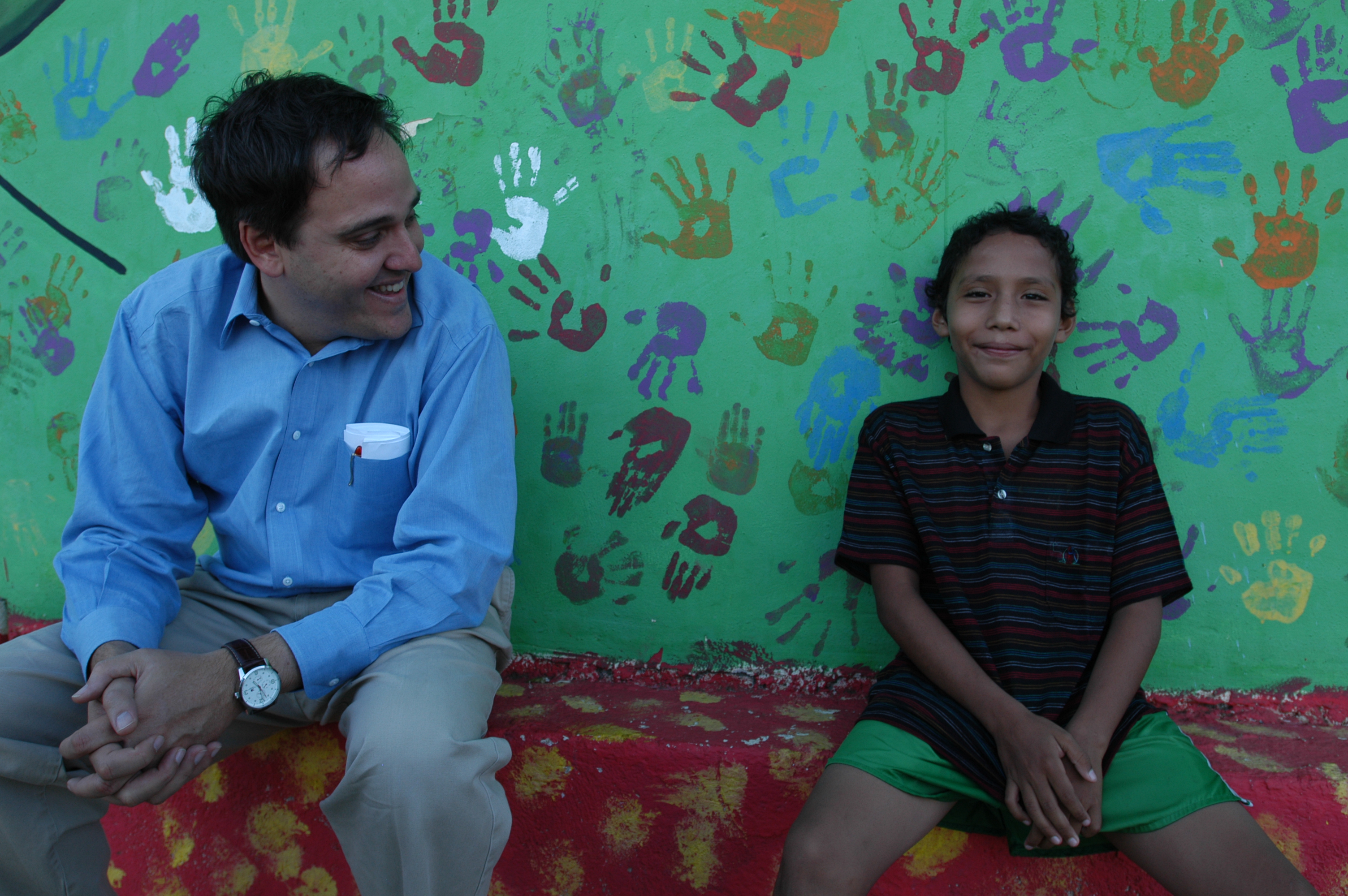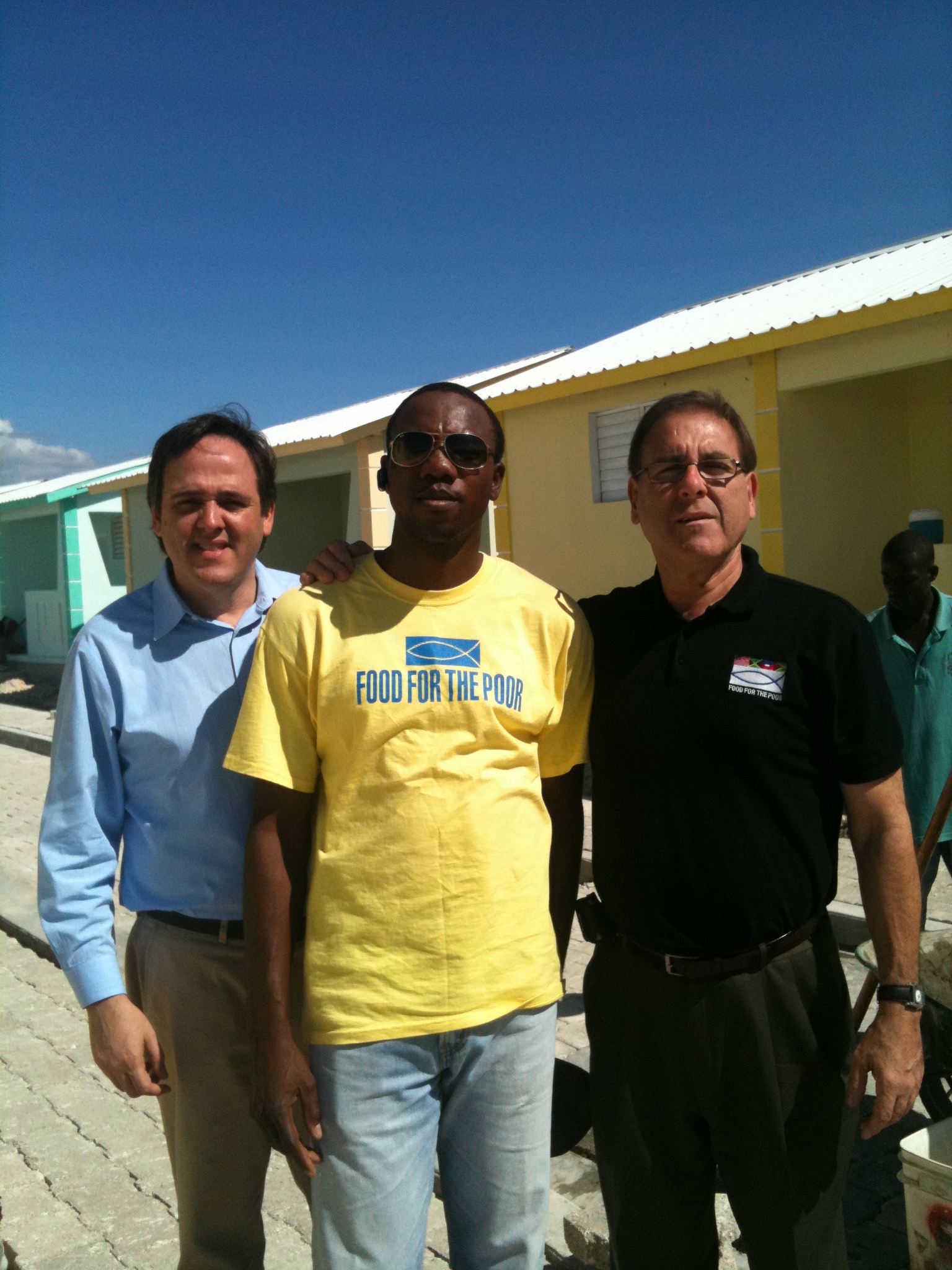By ROBBY BRUMBERG
Recently we spoke with FFP’s Executive Vice President Alvaro Pereira (pictured on the left in the photo above), about his involvement in international development, the importance of houses and happiness, and little bit about badminton. Enjoy!
Q: Can you tell us a bit about your background: where you grew up, what sort of work you’ve done in the past, etc.?
I grew up in Nicaragua. In 1979 my family emigrated from the country due to political unrest and moved to Washington D.C. It was a life changing experience, since we left the country with only one bag of possessions each. We learned that family, education and your attitude are the most important assets we all can have.
I consider D.C. my hometown in the USA. Growing up and living in a city like Washington opens your eyes to a lot of opportunities and gives you a global perspective.
I went to Texas A&M University (Gig ‘em Aggies!), where I studied Industrial Engineering (IE). While I’ve never ended up doing a full-time IE job, in everything I’ve done since then, my IE education has helped immensely. It’s been invaluable being able to use the training I received in processes, project management, distribution and other IE functions.
Q: Can you give us any moments that led to your becoming involved in the world of international development and charitable work?
I’ve always been interested in changing people’s lives, in one way or another. Before entering the development world, I was working for a political organization. Eventually I got tired of every decision being so ego-centric.
In 1992, I got a call from one of the founders of the American Nicaraguan Foundation (ANF) who told me they were building this organization to help the poor of our country. That was a major turning point in my life.

I joined them as the founding Executive Director and enjoyed working there for 19 years. And after serving on the FFP board for almost a decade, I joined the organization full time two years ago. I’m so grateful that God has given me great opportunities to help the poor over the past 20 years.
Through my opportunities to help the poor, I’ve learned to clearly understand that God is in control and will multiply our achievements if we are good stewards of his blessings; work hard, and we are honest and truthful in our actions and work for the poor. I also learned that our best accomplishments are reached in God’s time. As a human being, this is sometimes hard to accept. But God’s timing is perfect, despite our impatience.
Q: What are some of your favorite projects that FFP focuses on?
Housing is one of my favorite project areas. Housing impacts everything. It is such a crucial factor in everyday life. Typically if you have kids and are looking to move, what’re you looking for? Housing and school. The poor have the same needs and concerns we have. We can never lose sight of that.
“You take a family from a shack and get them into a new home, it brings back their faith in other humans and in God.”
Over the years I’ve seen how our FFP housing impacts communities in such a positive way. Many organizations take housing for granted, but safe, decent housing is truly one of the most fundamental needs we all have. Rich or poor, we all need a safe place to call home. You take a family from a shack and get them into a new home, it brings back their faith in other humans and in God. I always think of the mothers having to move the kids all over the place when it rains, trying in vain to keep everything dry and keep everyone calm during storms.
My wife and I have 3 (wonderful!) kids (18, 14, 11) and I remember those times of having to wake up with them when they were small. As any parent knows, the next day after a long night of crying, we were all dead tired and no one wanted to work or go to school! And we had a nice home with walls, a roof and air conditioning… These people have to huddle on the wet ground to protect their kids, wake up the next day exhausted and maybe sick, and still go work and take the kids to school. I can’t imagine trying to function with all those sleepless nights in an uncomfortable home.
But when people have a safe home you see the change in their everyday lives right away. The poor could never afford the homes we provide for them, even if they worked every day of their lives. The people are always so grateful for receiving a new home. So many times people have said to me how their new home is their ‘castle.’ When’s the last time you heard someone in the U.S. take so much pride in their home, or refer to their apartment as their castle?
Q: Can you recall any experiences in the field that impacted you in particular?
I’ll never forget an experience I had in a very poor area in northern Nicaragua. A group of about 10 of us were in the area, meeting with families and people who were in need. We were staying in a hotel that had just gotten this new corrugated metal roof. That night it rained so hard, no one could sleep. The drops were huge!
The next morning all 10 of us were complaining how we couldn’t sleep at all due to the rain pounding on the roof. An hour later, we went to visit a local family that was living in poverty. It was shocking to see what was left of their home, which was ruined by the previous night’s storm.
Out of the four original walls, only one was left standing. There were two plastic chairs in the middle of the one, open room and little else. We saw a woman carrying a baby and there was a grandmother there as well. We asked them how they managed to weather the storm the night before. How did they survive? They told us that they huddled together and spent the whole night in a nearby latrine.
We all agreed that would be the last time we complain about something like noisy rain.
Sadly this is the reality for millions around the world. That’s something I’ll never forget.
Q: Any hidden talents we may not be aware of?
“I always say that if we’re clear on the purpose and objective of what we’re doing, put our ego aside and focus on our purpose of helping the poor; our work will be blessed and multiplied.”
I would say that one of my talents is that I try to be a 100 percent collaboration person. I always say that if we’re clear on the purpose and objective of what we’re doing, put our ego aside and focus on our purpose of helping the poor; our work will be blessed and multiplied. That’s what I’m about and it makes our work easier and better. In this line of work, working together, partnering and supporting each other’s strengths is absolutely essential.
We tend to think we’re the ones who are in control, but it’s all God. With God we can accomplish all things.
We need to keep our egos aside and focus on helping the poor and not ourselves. That’s been the story of FFP.
Another hidden talent is that I was a badminton player in my younger days! A friend from Thailand taught me the game. Everyone thinks badminton is a relaxed family game, but it is very fast and extremely competitive.
Q: What are some hopes you have for the fight against poverty? Are there specific things you’d like to see happen within your lifetime?
In general, I would like to see changes throughout Latin America and the Caribbean. If the region improves, individual countries will improve.
Of course good jobs are important as well as good housing. These are basic things we can help provide. I’d love to see more programs where the poor can obtain good houses and see the children grow up with good education.
Most development organizations are focused on measuring the outcomes and measurables to gauge the success of their work, but how do you measure happiness? Our goals are bigger than just helping people to be more economically stable or educated. We are all human beings who at the end of the day want to be happy and fulfilled, so the work we do has to take this into account.
It’s always funny to see, if you analyze the relationship between wealth and happiness, it always seems to be inverse. In general, it seems that wealthy people have more anxiety and are less likely to report being “happy.” But nearly every time I travel with people from the U.S., they are always surprised to see how happy, upbeat and grateful the poor tend to be despite having so little. So it’s not just developing economics, but basic human needs. We should always include efforts to make people happy and fulfilled, and this is where the spiritual element of our work comes in. Happiness is one of the fruits of the Holy Spirit so it has to be important!
My family left Nicaragua with very little, but we were blessed with opportunities to rise above our circumstances. My hope and prayer is that more poor families have an opportunity to do the same.

